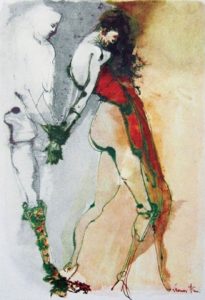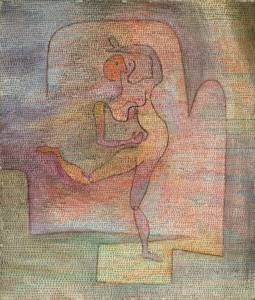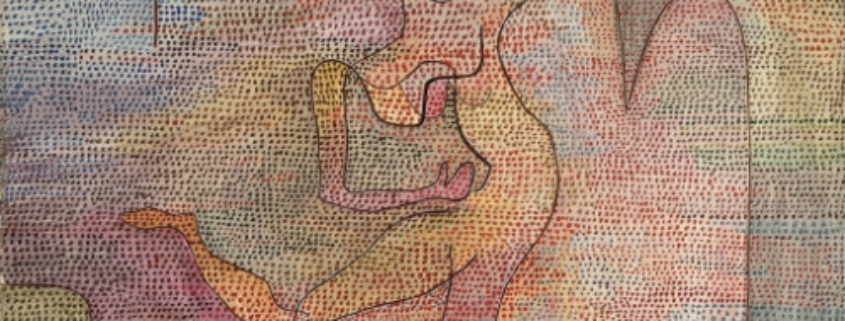A Recreational Use of Self

Leonor Fini, “Histoire d’O,” 1962.
When I arrive at the DMV at eight in the morning, the line is already out the door. A woman wanders person-to-person managing the queue with a clipboard of forms and checklists. She asks me what I am here for and when I say “Name change,” she congratulates me. “Thank you, I’m glad it’s over too,” I respond and her face drops. I have seen the face-drop before. The edges of my smile neither curl up or down as she apologizes for her gaffe, and I must look like I’m grimacing when I answer, “It’s fine.”
With my number, 110 C, in hand—the ticker counter clocked somewhere in the upper 90s—I find an empty orange bucket seat, like the kind you used to find in old Florida schoolhouses. There is bright new paneling and Formica countertops, but otherwise, the South Florida municipal building looks like an old bank or post office with its sad columns and terrazzo floors. In the hallway, the line grows long, wrapping in front of the elevators and out into the lobby, where a guard loads purses onto a second-hand baggage scanner, checking for guns. The DMV computers are running slowly so the lady with the forms walks around apologizing. Babies wail and are bounced impatiently on hips. Everyone wears flip-flops save for the people in work attire, dressed like lawyers or cellular phone salesmen. Phones and tablets illuminate a diverse array of faces.
After an hour-long wait, I am at the counter. The young woman behind the desk rolls through the requisite questions regarding the name change and accompanying paperwork: a court order that allows me by law to reclaim what’s mine, and a new social security card that proves, in the eyes of the government, that I am continuous with my former self. She stares at me as her computer reboots, as we wait for my driver’s license to reprint with my new name, my new-old name, my maiden name. Like the woman who checked me in and the woman who walked around with her clipboards, this lady has already apologized several times, both for the computers and the divorce. They are all sorry that I have to go through the trouble to reclaim something that’s already mine.
In December of 2014, I discovered that my husband was deeply unwell. He was diagnosed with bipolar disorder and extreme mania, which was not enough of a diagnosis to save my family from the orbit of lies that crashed towards us with terminal gravity. Just a few days after the doctor’s visit (first of many), I left for Los Angeles for my second MFA residency at Antioch University, where author and poet Nick Flynn would read new poetry and teach a seminar. In my bag, I carried his book of poetry Some Ether from one coast to the other. After his seminar, I made him sign it, a ritual I found both robotic and a little creepy. But I like seeing his signature on the front page. It provides me with a proof of memory to counter the numbness. To me, trauma feels like an opiate dream or a bad head cold. How perfect was Sylvia Plath’s bell jar, the feeling of watching the world from under thick glass.

Nick Flynn
In his poem, “Sudden,” Flynn writes of his mother’s suicide, “& the world became a bell we’d crawl inside/ & the ringing all we’d eat.”
“It’s fine,” I answer to the woman behind the desk at the DMV.
“But you seem happy?” Her question seems self-reflexive so I say nothing.
Should I be wearing the pain on the outside, in long black skirts, wailing like someone paid to be sad? Perhaps she thinks my messy hair is indicative of my interior state. But it always looks like this, I want to tell her. I almost tell her the sordid details of the divorce—the coming-apart that happened after December 2014, the legal problems, the emotional and psychological abuse, the emergency custody hearings, how I’ve feared for my safety and that of my children, how I wouldn’t wish this on my worst enemy. Yes, I’m happy to be on the other side of hell. But no, I’m not particularly happy.
the ringing all we’d eat
Time-sharing is not so bad, I have heard from well-meaning people offering advice about divorce. But I am full-custody mother. Absent father. Missing father. Missing-persons-report filed in some police station in Las Vegas, not by me, but by some later incarnation of me, another girl he met somewhere down the road, someone else his rapid-fire mind has outlived. He’s gone. Eyes widen. Pity comes pouring after and I feel manipulative, like I’ve created an artificial situation to boost me up, guilty of emotional manipulation, much like my ex-husband. This is the power of a good story. I have spoken in euphemisms for the majority of the last year and a half to avoid these raw reactions. How I choose to tell my story also informs my identity—a desire to please others, to feel loved, to feel less shame, to feel less stupid for giving up my maiden name, for believing the lies of my marriage.
The woman at the counter is doe-eyed and so I spare her. By now, it’s nine in the morning and their computers have crashed. It’s going to be a long day at the DMV.
I reply generically, “Divorce takes time, so when it’s over, you’re mostly relieved.”
She looks confused, a slight frown on her face. She’s pretty in a Sunday morning way, with white teeth, caramel skin, an open smile, a church face unmarked by either time or internalized ruin. We move on to discuss our children. I have two boys. She has one. She is still married. I want to tell her that life often offers the unfortunate illusion of stability. Finally, the machines reboot and my new license is printed.
Her large, concerned eyes are still attached to my face when she leans in and lowers her voice, “But do you think you will be able to start over?”
I laugh with awkward assurance. Later I think maybe I have a crazy laugh, maybe my weird half-smiles are unsettling. But her well-intentioned comment makes no sense in the real world. Did I get rebooted too? Is life made of discrete components that mash together and give the illusion of continuity? Is identity like that too—a before-and-after, laminated pages from a plastic surgeon’s office? I wish I could start over. I’d ask for different hair and less anxiety.

Paul Klee, “Dancer,” 1932.
A recent Brain Pickings essay examines Amin Maalouf’s book, In the Name of Identity, and quotes the author, “A person’s identity… is like a pattern drawn on a tightly stretched parchment. Touch just one part of it, just one allegiance, and the whole person will react, the whole drum will sound.” The study of personal identity is complex—a subject tackled by scientists, philosophers, psychologists, and, of course, by authors. As writers, we are constantly confronted with the problem of identity—our own in memoir, our characters in fiction—mostly it seems like an ad-hoc assemblage more than the construction of a “tightly stretched parchment.” We use words to make meaning of things that are hard to define, like self, like grief, like trauma. I have a good story. I am just not sure who is telling it anymore. Which incarnation of me suffered? Which me survived?
In an essay in Aeon, philosopher and literary critic Galen Strawson contests the idea that we are built only of narrative. Rather, he says, there exist two types: the storytellers and the others who are “anti-Narrative by fundamental constitution. It’s not just that the deliverances of memory are, for us, hopelessly piecemeal and disordered, even when we’re trying to remember a temporally extended sequence of events. The point is more general… Life simply never assumes a story-like shape for us.” Perhaps he is right. Or perhaps there is a middle ground. No grand narrative but a multiplicity of smaller stories.
So I borrowed his skin and glued it to the underside of mine, like a graft that takes root and grows, like an invasive vine that blankets a house, protects it from rain and snow, then tears it down.
Lately, I have been thinking about our social skin, the thin layer that cleverly masks our interior life and presents us to our peers in dazzling array. We wear different social skins depending on where we sit in life, what plastic chair in what DMV in what shoes in what era. I started over when I married and borrowed someone else’s last name, acquiesced to have my children be named for that distant, unknown family. I fought against a gradual tide, but it finally overtook me: the urge to disappear into a man. For as long as I can remember, I have had the underlying impression that I need someone else’s energy just to get through the day. So I borrowed his skin and glued it to the underside of mine, like a graft that takes root and grows, like an invasive vine that blankets a house, protects it from rain and snow, then tears it down. Once it had grown into all the crevices and phalanges, under membranes and pores, I was just a thin surface, no longer with any walls underneath me, a balloon inflated by his breath.
If Maalouf calls our identity a pattern drawn over the membrane of a drum, what happens when you lose your sense of self? When my husband disappeared, I felt pierced. There was no drum to sound. As Popova writes, “… we are increasingly pressured to parcel ourselves out in various social contexts, lacerating the parchment of our identity in the process.” What happens then?
& the world became a bell we’d crawl inside
& the ringing all we’d eat
My name comes back on my license, the same name from childhood. I slowly unglue one skin and regrow something new, something old. I could argue that personal identity doesn’t exist after trauma, within grief, outside of healing—stories, if ever they emerge, shape themselves only months and years later, after the ringing stops. In Love in the Time of Cholera, Gabriel García Márquez writes, “He allowed himself to be swayed by his conviction that human beings are not born once and for all on the day their mothers give birth to them, but that life obliges them over and over again to give birth to themselves.” Starting over each new second. Ad infinitum. A billion identities constantly in flux. How exhausting. I return to Nick Flynn.
Diana Odasso is currently an MFA student at Antioch University Los Angeles and Managing Editor for Lunch Ticket. She previously served as Lunch Ticket’s Translation co-editor, and has translated French literary texts to English (published in Jim Harrison’s The Raw and Uncooked), ghostwritten for an autobiography, and blogged for the Huffington Post. She lives in South Florida with her two young boys and Boston Terrier.






